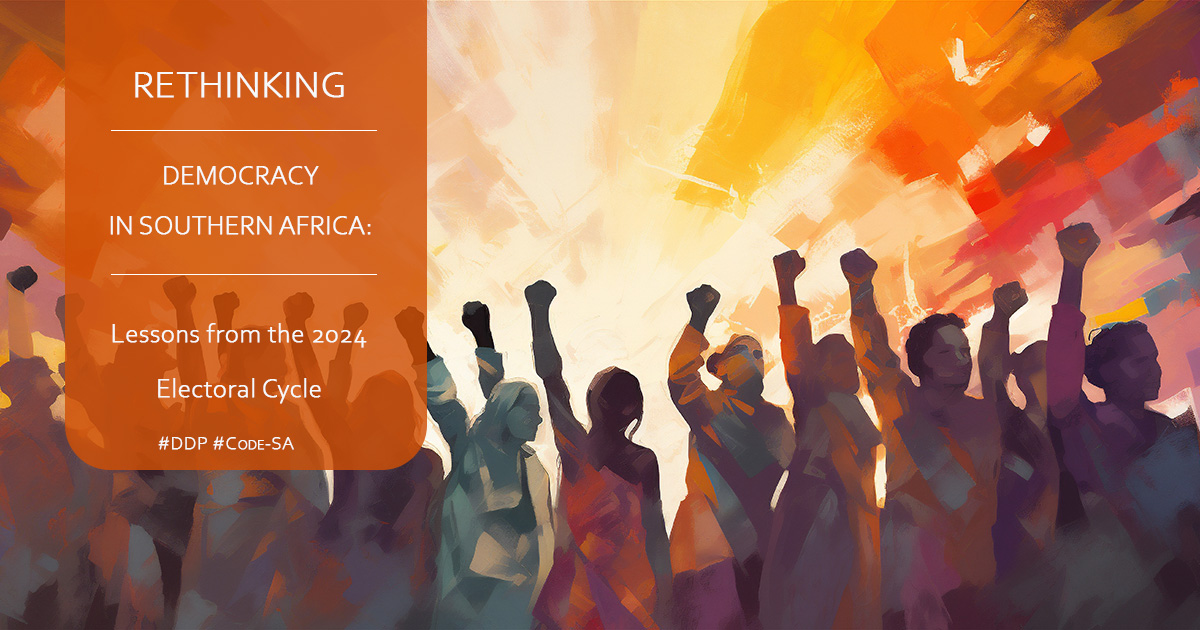On 31 July 31 2025, the Centre for Human Rights, Faculty of Law, University of Pretoria, in partnership with the Democracy Development Program (DDP) and CODE-SA, hosted a symposium that brought together electoral experts, civil society leaders, academics, and young activists to examine one of the most consequential election years in Southern Africa's recent history.
The 2024 electoral cycle across South Africa, Botswana, Mozambique, Namibia, and Mauritius revealed both the remarkable resilience and troubling fragility of the region's democratic institutions. This symposium provided a platform to assess electoral processes, examine shifts in political behavior, and propose concrete strategies to strengthen democracy ahead of the South African 2026 local government elections.
Substance Over Symbolism: Can Democracy Deliver?
Dr. Sthembile Mbete, Executive Director, Public Affairs Research Institute, delivered a keynote that challenged participants to move beyond electoral formalities. Her central question resonated throughout the symposium: “Can democracy keep us safe and feed us?”
This provocative inquiry reflected growing concerns that electoral rituals can outpace substance, particularly where institutions struggle to meet citizens' basic needs. Dr. Mbete argued that democracy must be reimagined to fit African realities without sacrificing its core principles. This transformation could involve highly decentralised governance rooted in local communities, balancing individual and collective rights, and evolving through the lived experiences of ordinary people many of whom are poor, rural, and navigating pre-industrial contexts.
Elections 2024: Lessons in Resilience
The 2024 elections were far from perfect, marked by electoral disputes, post-election violence, low turnout in some countries, logistical challenges for electoral commissions, and persistent misinformation campaigns. Equally, across Southern Africa, democratic systems demonstrated remarkable resilience under pressure. Peaceful transfers of power, exemplified in Botswana demonstrated democratic strength when the long-dominant Botswana Democratic Party (BDP) gracefully accepted defeat following Umbrella for Democratic Change (UDC) electoral victory. Additionally, South Africa's swift formation of a Government of National Unity signalled political maturity in the face of unprecedented electoral fragmentation. The challenge, therefore, is not to abandon democracy but to deepen it, ensuring that promises of safety, dignity, and economic opportunity transform from symbolic aspirations into tangible realities in people's daily lives.
Voter Turnout as a Barometer of Trust
Voter turnout remains a critical indicator in evaluating the health of a democracy, but it must be interpreted with nuance. While declining turnout in some contexts signals growing distrust in political institutions and frustration with limited choices, high turnout can also reflect vibrant democratic engagement and trust in the electoral system.
The 2024 elections demonstrated this dual reality. In countries like Botswana and Mauritius, high voter participation underscored the strength of democratic culture and public confidence in the electoral process. In Botswana, youth voter turnout played a pivotal role in shaping the political landscape, illustrating how engagement can drive meaningful change and peaceful political transitions. Mauritius similarly displayed a strong commitment to democratic participation, reinforcing institutional legitimacy.
However, challenges persist where turnout is low and reflects deeper issues of political disenfranchisement, systemic exclusion, and eroded trust. For young people especially, participation often requires overcoming skepticism about whether electoral outcomes will translate into real change.
Therefore, voter turnout should not be viewed simply as a number but as a reflection of trust, legitimacy, and democratic vitality. Strengthening democracy in Southern Africa requires reinforcing the conditions that encourage meaningful participation ensuring elections are free, fair, and inclusive, and that political engagement extends beyond the ballot box to sustained dialogue and accountability.
Youth, Waithood, and Political Exclusion
The symposium examined the concept of "waithood" the prolonged limbo between adolescence and adulthood caused by structural barriers including unemployment and economic exclusion. Across the continent, youth are not passive victims but active agents building parallel spaces of influence while refusing to legitimize tokenistic systems. Youth representation in politics often amounts to decoration without decision-making power. True inclusion demands institutional access, not merely demographic visibility. Power is not simply granted; it must be actively claimed. Despite ongoing dissatisfaction with governance, youth continue to wield significant influence through both electoral processes and sustained civic involvement throughout the year.
Digital Realities: Power and Peril
Social media has revolutionized political campaigning by enabling parties and movements to connect directly with voters, especially, through interactive and creative content, thereby increasing engagement and broadening outreach. However, this digital transformation also poses significant risks, as misinformation and manipulative content can spread rapidly online, particularly during election periods, often targeting vulnerable and young voters. While legal frameworks such as the Cybercrimes Act and Cybersecurity Bill provide mechanisms to regulate digital communication and combat these threats, enforcement remains inconsistent, leaving many voters exposed. In regions where access to reliable information is already limited, the unchecked spread of misinformation presents a serious challenge to democratic integrity. To safeguard the electoral process, it is essential to harness the benefits of technology while simultaneously strengthening enforcement, improving digital literacy, and fostering multi-sector collaboration to promote genuine dialogue rather than mere performative outreach.
The Path Forward: Reimagining Democracy for Southern Africa
The symposium concluded with a clear recognition that Southern Africa stands at a democratic crossroads. The 2024 electoral cycle revealed both the enduring strength of democratic institutions and the urgent need for fundamental renewal. Traditional approaches to political engagement are being challenged by a new generation that refuses to accept tokenism and demands substantive change.
The path forward requires moving beyond the false choice between abandoning democracy or accepting its current limitations. Instead, the region must embrace a more radical vision: deepening democratic practice through community-level organizing, authentic youth inclusion in decision-making structures, and the patient work of building alternative institutions that serve people's real needs. The future of democracy lies not in grand gestures or symbolic reforms, but in the quiet, strategic, and unstoppable work of citizens building a political culture they want to experience. Democracy is not a spectator sport, it requires active, sustained engagement from all citizens. It further requires politicians to directly talk to voters and lay out manifestos that address people’s challenges and change their lived realities.
For more information contact

Tel: +27 (0) 12 420 4199
bonolo.makgale@up.ac.za

Tel: +27 (0) 12 420 4199
Nomusa.nkwanyana@up.ac.za
